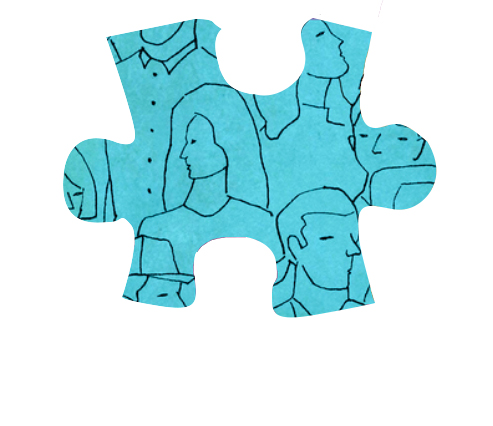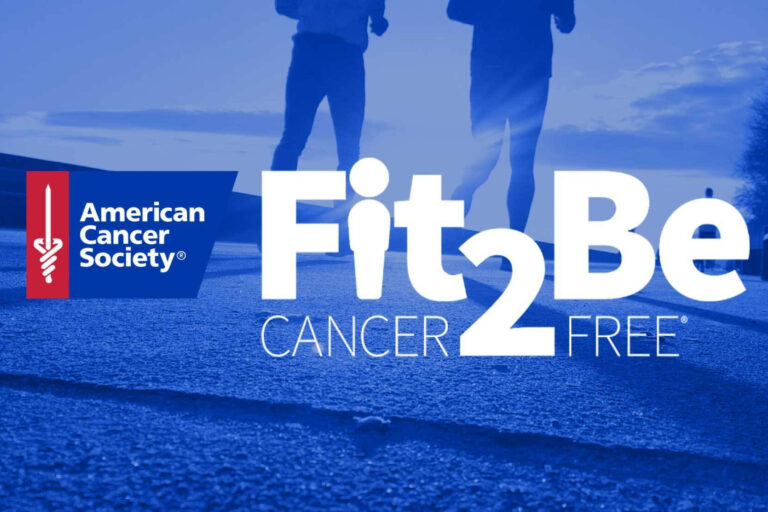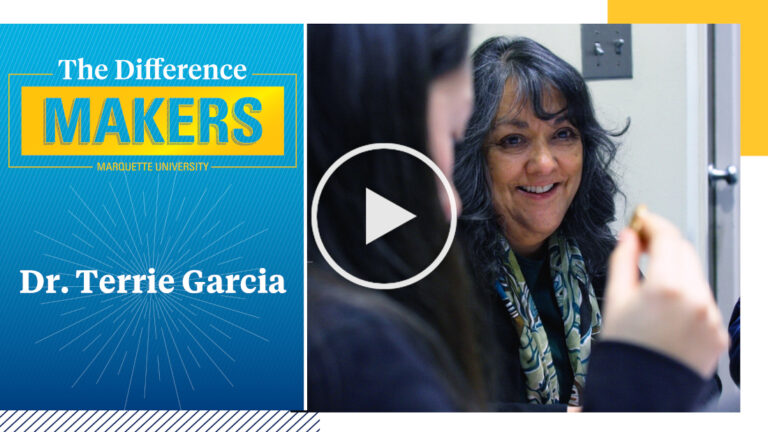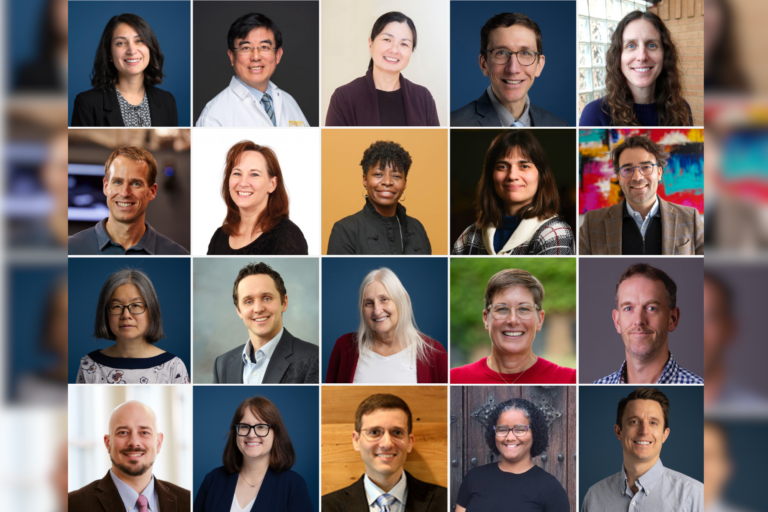Fitting innovative solutions to tomorrow’s problems starts with collaborative industry relationships.

By Erin O’Donnell
Well steeped in the Opus College of Engineering’s storied history is its strong connection to industry. After all, more than 240 companies in 25 states regularly offer Marquette engineering students valuable co-ops and internships through programs more than a century old. Never resting on its laurels, the Opus College is currently forging deep, next-generation partnerships with companies such as Kohler Co. and Omron Automation, creating new ways for students, faculty members and companies to collaborate, learn from one another and face the challenges of a rapidly changing world together.
“In this environment, if you don’t keep thinking differently, you’re going to be left behind,” says Dr. Kris Ropella, Opus Dean of the Opus College of Engineering. “Today there are a lot of unknowns. We’re going places we’ve never had road maps for, politically, economically and education-wise. We all see the need to innovate and think differently than we have in the past.”
All of this means pursuing new university-corporate relationship models — especially those that foster innovation and synergistic collaborations.
A steadfast partnership eyes the future
Marquette’s relationship with Kohler began in 1919 and was formalized last fall with a global agreement that streamlines the process for students and faculty members to work with Kohler teams across the company. Marquette is home to the Kohler Center for Entrepreneurship, which offers programming to help students, faculty and staff with their entrepreneurial aspirations through mentoring, workshops, speaker series and funding. Dozens more students and faculty members across the university are currently engaged with Kohler through research projects, internships, scholarships and professional education. “This is the most comprehensive engagement we have at Marquette,” explains Dr. Carmel Ruffolo, Marquette’s associate vice president for corporate engagement.

The Opus College recently added a new element to its relationship with Kohler by launching the Kohler Engineering Leadership Development program, in which Kohler engineers receive leadership development from Marquette faculty and staff with a focus on elevating innovation.
The first cohort of Kohler engineers in the program, from the company’s global power and kitchen and bath groups spanning the U.S. and EMEA, began the program in March. They met regularly through a combination of virtual and in-person sessions and completed the curriculum in August. A new cohort of Kohler associates will begin the program soon.
The curriculum is customized to Kohler’s needs but built around the Opus College’s multidisciplinary programs. “The first module is really about unleashing your creative genius, helping people with the self-awareness of who they are, their strengths, their personal mindsets and relationships to risk and failure,” explains Kate Trevey, Bus Ad ’04, Nana Fotsch Director for the Fotsch Innovation and Engineering Leadership Development Center at Marquette, who began her career as an analyst at Kohler. “You can’t ask that of a team if you’ve not explored that for yourself.” The program also explores a process of harnessing called “collective genius.”1 This involves recognizing and appreciating the talents and perspectives that each employee brings to the team and establishing an environment in which staff members feel safe proposing new ideas.
Ropella is also passionate about preparing young engineers to advocate for their ideas. “Some early career people are afraid to bring new ideas to their supervisors,” she says. “They don’t necessarily have skills and tools to have tough conversations or disrupt ideas. We teach them how to do that in a professional, effective way.”
Philip Malliet, Eng ’84, Grad ’94, CEO of Hayes Performance Systems, approached Ropella about offering leadership training to early career engineers and technology staff at his company. Ropella and Trevey led the training, which became a pilot program for future Marquette-industry leadership courses. Trevey gathered data about what worked and didn’t work, which gave them information to improve the curriculum for other companies, including Kohler.
New collaboration with Omron Automation flourishes
The Opus College has also been collaborating internally with the College of Business Administration to help engineering students develop greater business acumen. Companies are eager for engineers who also have business expertise. Omron Automation, which has American headquarters outside Chicago, began working with Marquette’s engineering and business faculty to develop new talent pipelines for its engineering, technical sales and supply chain management workforce needs.
Ropella says that Omron is a fitting partner for Marquette. “When I walked into their headquarters and read their mission statement on the wall, it sounded like the Marquette mission statement,” she notes. The relationship began to deepen, with the Opus College looking for ways that Omron Automation could help inform the engineering curriculum and “engage with faculty over research challenges,” Ropella explains.
This led the company to make a more than $1 million gift to Marquette to establish the Omron Advanced Automation Lab in Engineering Hall, which will be used by engineering students as well as business students studying supply chain management, allowing them to explore issues related to automation, robotics and manufacturing. The Omron gift is also supporting the development of a graduate-level certificate in automation.

Omron Automation also sponsors technical sales pitch competitions on campus. Students from a variety of disciplines make sales pitches for Omron technologies and products to Omron executives acting as prospective manufacturing clients. “Students get firsthand experience doing a sales pitch in a safe environment, but it’s relevant because you’re doing it with a real company,” Ruffolo says. She adds that programs like these make companies aware of promising student talent, as well.
Opportunities expand for faculty
Another extension of the college’s innovative industry relationship-building is the growing number of faculty members who are completing externships or sabbaticals with industry partners. These stints away from the academy can help professors forge relationships that can lead to shared research projects and shape the way faculty members teach their courses.
For example, Dr. Jay Goldberg, professor of practice in biomedical engineering, served a five-week externship at GE Healthcare, investigating technologies that enhance the patient and user experience during MRI scans. Before coming to Marquette, Goldberg spent 14 years in new product development for the medical device industry.
“I left industry 23 years ago, so I wanted to go back for a short time to learn about new trends and tools in product development, product management, design and innovation,” Goldberg says. “My goal was to confirm that what I am teaching is relevant and up-to-date and helps prepare my students for careers in industry.”
Dr. Patrick McNamara, Eng ’06, associate professor of civil, construction and environmental engineering, took a sabbatical during the 2021–2022 academic year and spent it working full time for engineering firm Black & Veatch, where he focused on wastewater process engineering. “I looked at large datasets including chemistry, microbiology and mass flows, and tried to determine why a certain wastewater treatment process failed and how to improve it,” he explains.
He says this experience makes him better able to incorporate current, real-world challenges and engineering problems into homework, lectures and exams. “Bigger picture, I can be a better career mentor to students about what work life is like and how to prepare for it,” he adds. McNamara also sees ways that this experience could influence future research projects.
“Research is a blend of working on problems now and predicting problems of the future,” he says. “I have a better sense for what problems in the field are and what future problems will be.”
These faculty opportunities in addition to the partnerships with Kohler Co. and Omron equip Marquette to prepare students for a rapidly changing world. Ropella says that given this environment, it’s essential “to think differently about our educational programs, our research programs, how we translate some of the discovery that we do in our research labs into real solutions and real products and real businesses. Industry tends to do that well, so we need to partner better.”
______________
1 From Collective Genius: The Art and Practice of Leading Innovation by Dr. Linda Hill, professor, Harvard Business School



